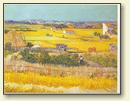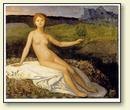| Relevant paintings: 
"Still Life: Vase with Twelve Sunflowers," Vincent van Gogh
[Enlarge]

"Still Life: Vase with Fourteen Sunflowers," Vincent van Gogh
[Enlarge]

"Vase with Twelve Sunflowers," Vincent van Gogh
[Enlarge]

"Still Life: Vase with Fourteen Sunflowers," Vincent van Gogh
[Enlarge]

"La Berceuse (Augustine Roulin)," Vincent van Gogh
[Enlarge]

"La Berceuse (Augustine Roulin)," Vincent van Gogh
[Enlarge]

"La Berceuse (Augustine Roulin)," Vincent van Gogh
[Enlarge]

"Harvest at La Crau, with Montmajour in the Background," Vincent van Gogh
[Enlarge]

"The White Orchard," Vincent van Gogh
[Enlarge]

"Hope," Puvis de Chavannes
[Enlarge]
|
My dear Theo,
Only a few words to tell you that my health and my work are
not progressing so badly.
I still have a sort of “what is the good of getting
better?” feeling about me, even in the astonishment
aroused in me by my getting well, which I hadn't dared hope
for.
During your visit I think you must have noticed the two size
30 canvases of sunflowers in
Gauguin's room. I have just put the finishing touches to
copies, absolutely identical replicas of them.
I think I have already told you that besides
these I have a canvas of “La Berceuse” the very one
I was working on when my illness interrupted me.
I now have two versions of this one too.
I have just said to Gauguin about this picture that when he
and I were talking about the fishermen of Iceland and of their
mournful isolation, exposed to all dangers, alone on the sad
sea - I have just said to Gauguin that following those intimate
talks of ours the idea came to me to paint a picture in such a
way that sailors, who are at once children and martyrs, seeing
it in the cabin of their Icelandic fishing boat, would feel the
old sense of being rocked come over them and remember their own
lullabies.
Now, it may be said that it is like a chromolithograph from
a cheap shop. A woman in green with orange hair standing out
against a background of green with pink flowers. Now these
discordant sharps of crude pink, crude orange, and crude green
are softened by flats of red and green.
I picture to myself these same canvases between those of the
sunflowers, which would thus form torches or candelabra beside
them, the same size, and so the whole would be composed of
seven or nine canvases.
(I should like to make another duplicate for Holland if I
could get hold of the model again.)
Since it is still winter, look here, let me go quietly on
with my work; if it is that of a madman, well, so much the
worse. I can't help it.
It is still beyond my powers to go into the details of this
money question, and yet I want to do that very thing, and I am
furiously at work from morning till night, to prove to you
(unless my work is another hallucination), to prove to you that
indeed and indeed we are following Monticelli's track, and
what's more, that we have a light before our feet and a lamp
upon our path in the powerful work of Brias of Montpellier, who
did so much to create a school in the South.
Only don't be too amazed if during the next month I shall be
obliged to ask you for the month's money in full and some extra
money as well.
After all it is only right that during periods of
productivity, on which I spend all my vital warmth, I should
insist on what is necessary in order to take a few
precautions.
Even in that case the difference in expenditure is certainly
not excessive on my part.
And once again, either shut me up in a madhouse right away -
I shan't oppose it, for I may be deceiving myself - or else let
me work with all my strength, while taking the precautions I
speak of. If I am not mad, the time will come when I shall send
you what I have promised you from the beginning. Now perhaps
the pictures are alas bound to be dispersed, but when you for
one see the whole that is in my mind, I dare hope it will make
a comforting impression on you.
You saw, as I did, part of the Faure collection being passed
in review one by one in the little window of that picture
framer's shop in the Rue Lafitte, didn't you? Like me, you saw
that this slow succession of once despised canvases was
strangely interesting.
Good. My great desire would be that sooner or later you
should have a series of canvases of mine which might likewise
march past in just that same window.
Now by continuing this furious work during next February and
March, I shall hope to have finished the quietly composed
repetitions of a number of studies I made last year. And these
together with some canvases you have already had from me, such
as the “Harvest” and the
“White Orchard,” will form a
tolerably firm foundation. By that same time, not later than
March, that is, we can arrange what there is to arrange on the
occasion of your marriage.
But during February and March, though working, I shall go on
considering myself an invalid, and I tell you beforehand that
for those two months I shall perhaps have to take 250 a month
from the year's allowance.
You will perhaps understand that what would reassure me in
some fashion as to my illness and the possibility of a relapse
would be to see that Gauguin and I had not exhausted our brains
for nothing, but that some good canvases have come out of
it.
And I dare to hope that someday you will see that by keeping
steady and straight in this money business, in the longer run
it will prove to be impossible that you have acted against the
interests of the Goupils.
But if I should have eaten their bread indirectly through
you as an intermediary, in that case my integrity would be
directly involved.
Then, however, far from going on feeling more or less
embarrassed by each other because of it, we shall be able to
feel even more like brothers after that has been arranged.
You will have gone on being poor all the time in order to
support me, but I will give you back the money or give up the
ghost. Meanwhile this tender-hearted wife of yours will have to
come, and will make us old fellows almost young again.
But this I believe, that you and I will have successors in
our business, and that just as when the family, financially
speaking, abandoned us to our own resources, once again it will
be we who never flinched.
And after that, the deluge… Am I wrong in this?
Indeed, as long as this world lasts, so long will there be
artists and picture dealers, especially those who, like you,
are at the same time apostles.
What I am telling you is true. If it is not absolutely
necessary to shut me up in a cell, then I am still good for
paying, at least in goods, what I am considered to owe. In
conclusion, I still have to tell you that the chief
superintendent of police paid me a very friendly visit
yesterday. He told me as he shook hands that if I ever needed
him, I could consult him as a friend. I am far from
refusing that, and I may soon be in just that position if they
raise difficulties about the house.
I am waiting till the time comes for me to pay the month's
rent to interview the agent or the proprietor face to face.
But if they try to kick me out, they will find themselves
tripped up this time anyhow.
What would you? We have gone all out for the impressionists,
and now as far as it's in my power I am trying to finish
canvases which will undoubtedly secure me the little corner
that I have claimed. Ah, the future of it all…but since
old Pangloss assures us that everything is always for the best
in the best of worlds - can we doubt it?
My letter has grown longer than I intended, but it doesn't
matter. The main thing is that I am asking categorically for
two month's work before making the arrangements which will have
to be made at the time of your marriage.
After that, in the spring, you and your wife will found a
commercial house for several generations. It will not be too
easy. And that settled, I only ask the position of a painting
employee, at least as long as there is enough to pay one.
The work distracts my mind. And I must have some
distraction. Yesterday I went to the Folies Arlésiennes,
the budding theatre here. They were giving (it was a
Provençal literary society) what they called a
Noël or Pastorale, reminiscent of the Middle
Ages. It was a very carefully studied performance, and must
have cost them a lot of money.
It represented, of course, the birth of Christ, mixed up
with the burlesque of a family of gaping Provençal
peasants.
But the amazing thing about it, like a Rembrandt etching,
was the old peasant woman, just such another as Mme. Tanguy,
with a head of silex or flint, dishonest, treacherous, silly,
all this very evident from the preceding scenes.
Now in the play that woman, led before the mystic crib,
began to sing in her quavering voice, and then the voice
changed, changed from the voice of a witch to that of an angel,
and from an angel's voice to a child's, and then the answer
came in another voice, strong and warm and vibrant, the voice
of a woman behind the scenes.
It was amazing. I can tell you these so-called
“Félibres” had certainly put themselves to
expense.
As for me, being in this little country of mine, I have no
need at all to go to the tropics. I believe and I shall always
believe in the art that is to be created in the tropics, and I
think it will be marvellous, but personally I am too old and
(especially if I have a papier mâché ear put on)
too jerry-built to go there.
Will Gauguin do it? It is not essential. For if this ought
to be done, it will happen of itself.
We are nothing but links in a chain.
Old Gauguin and I understand each other basically, and if we
are a bit mad, what of it? Aren't we also thoroughly artists
enough to contradict suspicions on that score by what we say
with our brush?
Perhaps someday everyone will have neurosis, St. Vitus'
dance, or something else.
But doesn't the antidote exist? In Delacroix, in Berlioz,
and Wagner? And really, as for the artist's madness of all the
rest of us, I do not say that I especially am not infected
through and through, but I say and will maintain that our
antidotes and consolations may, with a little good will, be
considered ample compensation.
Ever yours, Vincent
See “Hope” by Puvis de Chavannes.
At this time, Vincent was 35 year oldSource:
Vincent van Gogh. Letter to Theo van Gogh. Written 28 January 1889 in Arles. Translated by Mrs. Johanna van Gogh-Bonger, edited by Robert Harrison, number 574.
URL: https://www.webexhibits.org/vangogh/letter/19/574.htm.
This letter may be freely used, in accordance with the terms of this site.
|